Intel X25-M SSD: Intel Delivers One of the World's Fastest Drives
by Anand Lal Shimpi on September 8, 2008 4:00 PM EST- Posted in
- Storage
Real World Performance with PCMark Vantage
Next up is PCMark Vantage, another system-wide performance suite. I chose to run the whole suite rather than just the HDD test to hopefully better characterize real world performance of these drives.
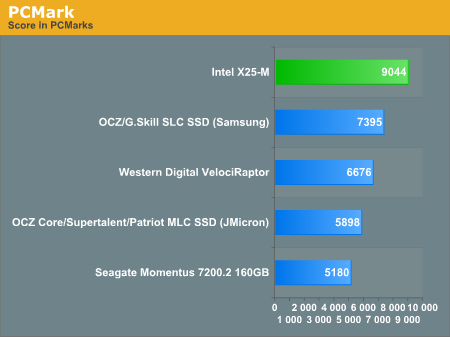
If we look at the individual test subsets of PCMark Vantage we can see the drive's strengths at work.
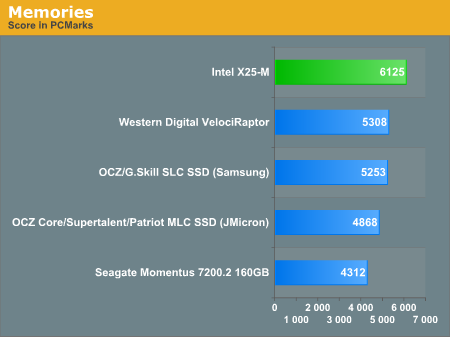
The memories suite for example includes a test involving importing pictures into Windows Photo Gallery and editing them, a fairly benign task that easily falls into the category of being very influenced by disk performance. The end result is a 15% performance advantage over the VelociRaptor, a 16.6% advantage over the Samsung SLC based SSDs and a 42% advantage over the 2.5" Seagate Momentus 7200.2 HDD - the X25-M is great for a desktop, but a miracle for a notebook.
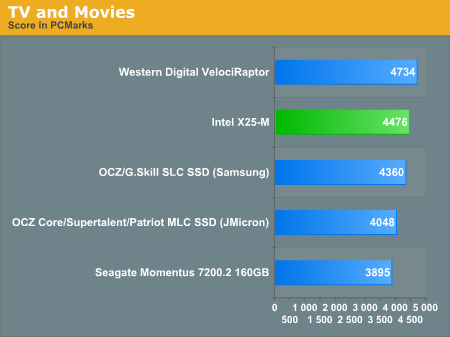
The TV and Movies suite shows that the X25-M won't always dominate. Here the tests are focused on video transcoding which is mostly CPU bound, but one of the tests involves Windows Media Center which tends to be disk bound. Despite the nature of the test, the X25-M competes at the top of the chart but is bested by the VelociRaptor. It's performance isn't bad, but not earth shattering. Again, compared to other notebook drives it is a dream come true.
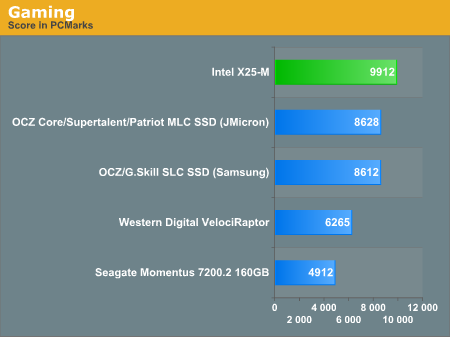
The gaming tests are very well suited to SSDs since they spend a good portion of their time focusing on reading textures and loading level data. All of the SSDs dominate here, but as you'll see later on in my gaming tests the benefits of an SSD really vary depend on the game. Take these results as a best case scenario of what can happen, not the norm. You can also see how tempting it is to opt for one of those JMicron based MLC SSDs, they perform quite well here - the test simply doesn't show the ugly side of living with them.
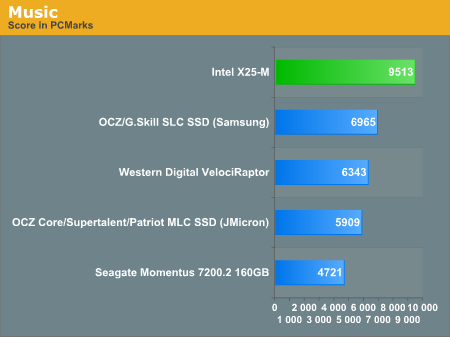
We're back to utter domination in the Vantage Music test. Here the main test is a multitasking scenario, which SSDs do quite well in: the test simulates surfing the web in IE7, transcoding an audio file and adding music to Windows Media Player (the most disk intensive portion of the test). The X25-M is nearly 60% faster than the VelociRaptor, around twice the speed of the Seagate Momentus 7200.2 and over 37% faster than the Samsung SLC based SSDs. When the X25-M is fast, it's very fast.
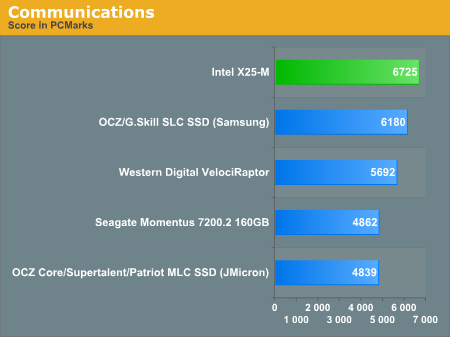
The Communications suite is made up of two tests, both involving light multitasking. The first test simulates data encryption/decryption while running message rules in Windows Mail. The second test simulates web surfing (including opening/closing tabs) in IE7, data decryption and running Windows Defender.
Despite the inclusion of Windows Defender, the X25-M's advantage over the VelociRaptor is only 18%. I would honestly expect more based on some of my other system scanning tests, but I believe the reason we're seeing general domination and not utter destruction is that the tasks being run alongside Windows Defender are quite light on the disk. Yes, I am nitpicking an 18% victory - this drive is that good. The SLC drives do well here but are no match for the X25-M. It's in tests like this that the X25-M really earns its keep, it delivers SLC performance at a much lower cost.
The Productivity test is awesome, let me explain:

In this test there are four tasks going on at once, searching through Windows contacts, searching through Windows Mail, browsing multiple webpages in IE7 and loading applications. This is as real world of a scenario as you get and it happens to be representative of one of the most frustrating HDD usage models - trying to do multiple things at once. There's nothing more annoying than trying to launch a simple application while you're doing other things in the background and have the load take seemingly forever.
Note that the test itself isn't very write intensive, so even the JMF602 based MLC drives do well here. I can attest to this as one of the things that drove me to put a SSD in my desktop was that I wanted my applications to pop up instantaneously, regardless of what I was doing. The pausing doesn't get a chance to rear its head, so all of the SSDs rule the playing field here. The X25-M delivers 2x the performance of the VelociRaptor here and is faster than every other drive. Enough said.










96 Comments
View All Comments
Anand Lal Shimpi - Tuesday, September 9, 2008 - link
I think the question was: how much more performance is left untapped by current controller designs? The JMicron issues are a limited case, what will truly be telling is what happens when we see Intel vs. Samsung with SLC drives...The dominating the charts line was in reference to the Crysis results. If you've ever run the Crysis GPU bench you'll know that it is extremely disk intensive (particularly the first run). As I mentioned in the article, it over emphasizes the importance of disk performance but that's not to say that the results aren't valid.
I do see your point however, let me see what I can do about clarifying that statement.
-A
yyrkoon - Tuesday, September 9, 2008 - link
Ok, I guess I missed the JMicron 'thing', but to be perfectly honest I dislike *anything* JMicron and try to avoid them whenever possible. I guess I am just so interested in these Intel drives, I just tuned everyting else out. However, I did read what you mentioned about 'trouble-shooting' the JMicron MLC issue.Never ran Crysis, and do not plan on running it anytime soon if ever, but I am somewhat of a hardcore gamer.
Keep up the good work, and PLEASE do keep us informed on at least these Intel SSD drives :)
BD2003 - Monday, September 8, 2008 - link
If the achilles heel of the JMicron MLC is the random write speed, why couldnt a ram buffer be used to cache writes? Sure this would cause a serious problem if the power went out, but thats an issue some would be willing to live with.I'm fairly sure vista has an option for this in the device manager in the properties tab of a drive - "enable advanced disk performance". I wonder if that would have any effect on the results?
DigitalFreak - Monday, September 8, 2008 - link
Yet more proof that JMicron products are shit.ggordonliddy - Monday, September 8, 2008 - link
For the love of all humanity: If you are going to write for a living, please learn basic comma usage!It is NOT okay to just stick a comma in the middle of a sentence anytime you want. And it gives readers a headache.
Here is just one of numerous examples of improper comma usage I've seen so far (and I've only gotten to the 3rd page!):
"Intel certifies its drives in accordance with the JEDEC specs from 0 - 70C, at optimal temperatures your data will last even longer [...]"
The comma before "at optimal" should be replaced with a semicolon or a period (I prefer the semicolon).
Did you actually pass your English classes? I'm guessing that you probably did and you are just a product of our miserable public school system that refuses to hold students to any real level of accountability.
(And BTW, your quoting system is broken. When I enter text in the Quote Text dialog and click OK, nothing new appears in the Comment compose field.)
7Enigma - Friday, September 19, 2008 - link
Honestly man, you need to seriously relax. My personal rule of thumb for grammar is does the mistake make the understanding of the sentence difficult to comprehend.Writing something like, "Intel certifies its drives in accordance with the JEDEC specs from 0 - 70C, at optimal temperatures your data will last even longer [...]", while not grammatically correct is completely readable.
If it was something like, ""Intel certifies drives to accordance with the JEDEC specs from 0 - 70C, at optimal data your temperatures will last even longer [...]", now you have a legitimate beef.
The former can easily be forgiven, the latter makes my head hurt when I read it. Trust me, whatever you do, do not go to Dailytech.com and read the articles. Those even I get annoyed at frequently and I'm very forgiving.
Anand Lal Shimpi - Tuesday, September 9, 2008 - link
You're quite right, thanks for the heads up :) Some of the article was directly from my notes while I was working on the tests, so that's one source of unpolished bits. I know I'm far from perfect, so I do appreciate your (and anyone else's) assistance.Thanks :)
Anand
pkp - Tuesday, September 9, 2008 - link
Thanks for posting, Anand. I see you're already aware of the problem, but I wanted to throw my two cents in.What is the usual editing process? I think a once over by a second set of eyes would have caught the bulk of the grammatical errors.
Of course, the ultimate issue isn't commas. It's readability. However, the problem was bad enough that I'm making this comment without having even gotten through the first page of this article.
JarredWalton - Tuesday, September 9, 2008 - link
I'm often the content editor for posted articles, but often we skip that stage due to late nights and schedules. Doing a final thorough edit can require a couple hours (edit and then HTLM-ize), and when someone finishes an article at 5AM or whatever and it's an NDA type piece, delaying it any further is usually not desired by the readers or us.I do read all posted articles, and often I take the time to go through and fix any noteworthy errors. A few misplaced commas don't really detract from a 5000 word article, however, and depending on what else is going on I may or may not edit the text. If anyone takes the time to point out specific errors, i.e. "on page 3 you write "...." they always get corrected - at least if I see it. General complaints are much more difficult to address though, i.e. "You used passive voice and therefore you must DIE!" LOL.
I know personally that when you write a long article with lots of testing, certain thoughts tend to appear in multiple places and the final result isn't always as coherent as I would like. Trying to "fix" problems relating to flow and readability is difficult at best, and requires more time than we generally spend. If anyone wants to make specific suggestions, though, we're open for input as always.
Perhaps it's useful to compare the process to print publications. Magazines usually have several editors on staff whose job is solely to edit other authors' work; I can say that we don't have anyone at AnandTech in that position these days. (I edit some of the articles, but not all, and even then I make mistakes.) That's probably why we have more typos than magazines, but then we provide far more thorough coverage as well. Last I saw, most magazine hardware reviews end up being one page and ~1000 words, with a couple charts.
At the end of the day, I get most of my detailed information from the internet. Magazines might be more grammatically correct, and they make for great toilet reading, but I don't generally depend on them as a source of credible information. I'd say it's safe to say we won't see such an in-depth exploration of SSD performance and issues in any magazine. [Now I have to prepare to have someone point me to an article in some magazine that does exactly that.]
Cheers,
Jarred
KikassAssassin - Tuesday, September 9, 2008 - link
Then I guess I should point you to an article in last month's issue of my favorite data storage magazine.http://www.solidstatedisksmonthly.com/2008/08/ever...">http://www.solidstatedisksmonthly.com/2...erforman...
Unfortunately, their website seems to be down at the moment, but keep checking it, I'm sure it'll be back up soon (and don't be fooled by the article's title. It's actually only 23 pages without the ads).